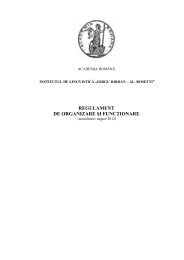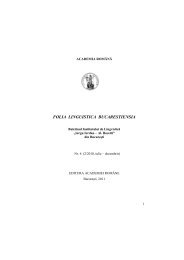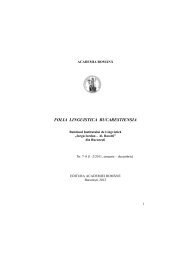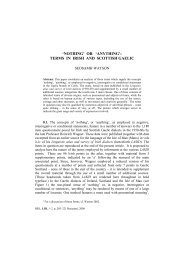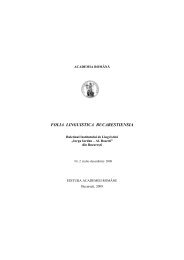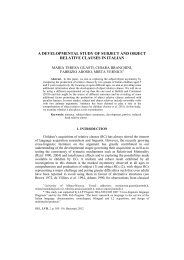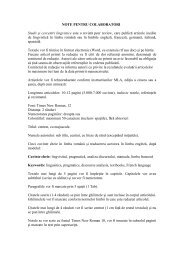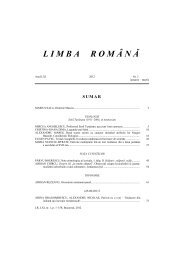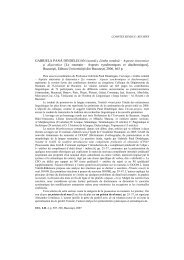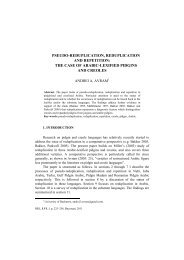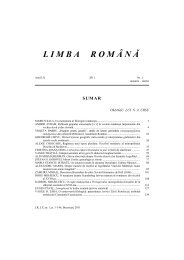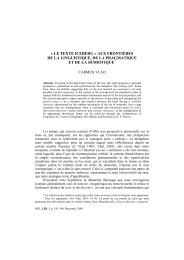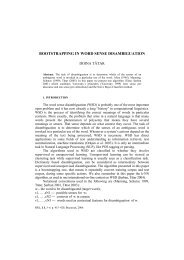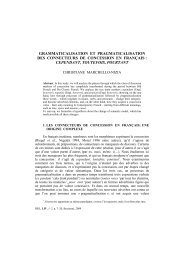Create successful ePaper yourself
Turn your PDF publications into a flip-book with our unique Google optimized e-Paper software.
300<br />
Ian Hancock<br />
Examples include PK chocháng (‘a Chinese’), Chin. tau chang (‘pigtail’); tong<br />
(‘box’), Chin. t’ong; lau (‘prepared food’), Chin. lao (‘mixed’), &c.<br />
Also fairly scant is the contribution from various Indian languages. From<br />
Konkani come saguáti and chádu (‘gift’, ‘clever’, Kon. saguvat and chiadh), from<br />
Hindi are chítu and mbísi (‘ticket, note’ − whence also English chit or chitty − and<br />
‘to insult’, Hin. chitti and bishi), and from Malayalam come patáyă and mainátu<br />
(‘food container’, ‘laundryman’), Malayalam pattayam and mainattu.<br />
Structurally Papia Kristang exhibits the typically creole feature of extreme<br />
morphological reduction. In the verbal system, tense and aspect are marked by the<br />
particles ja for the past, logo (often abbreviated to lo’) for the future, and ta for the<br />
non-completive aspect. This last particle has no time reference, and may combine<br />
with either logo or ja. In addition most verbs have an adjectival form derived by<br />
the addition of -du to the basic verb form. The following few examples will<br />
illustrate the function of these particles: yo lo’ kebrá isi pau, ‘I will break this<br />
stick’; isi pau kebrádu, ‘this stick is broken’; eli ja bai na káză, ‘he went to the<br />
house’; bos ja ta drumí ki-óră nu chegá, ‘you were sleeping when we arrived’, ta<br />
kai chúă, ‘it is raining’ (i.e, ‘is falling rain’), ozi-díă akáli krénsă lo’ ta kantá pa’<br />
nos-túdu, ‘today that child will be singing for us’. Note that the verb used without<br />
particles expresses either present or past action: yo kumí să kukís, ‘I ate her cake’.<br />
The verb ‘to be’ in the sense of ‘become’ is fiká: yo keré fiká méstri-di-skólă,<br />
‘I want to be a teacher’. To be in a place is teng: tántu kachóru teng na rúa, ‘many<br />
dogs are in the street’. There is no copula verb, thus éli ómi, ‘he is a man’.<br />
The passive may be expressed either by employing the adjectival form of the<br />
verb with the suffix -du, or by using the verb toká (‘incur, be affected by’),<br />
modelled on the Malay kena, which has the same meaning and function: yo lisádu,<br />
‘I am hurt’ (from lisá, ‘to hurt’), yo toká pangkáda, ‘I was hit’.<br />
Adjectives in Papia Kristang are also verbs, although the reverse is not true.<br />
Thus brángku means ‘white’ or ‘be white’. Such verbal adjectives may combine<br />
with lógo and ja, but evidently not with ta: nu lo’ alégru ki-óră nu chegá nalá,<br />
‘we’ll be happy when we get there’, yo ja trísti pádi úbi akéli, ‘I was unhappy to<br />
hear that’. Vestiges of noun-adjective concord are to be found with a few<br />
adjectives, although this is by no means strictly adhered to: éli ómi bunítu, ‘he is a<br />
handsome man’, éli mulé buníta, ‘she is a beautiful woman’. Other verbal<br />
adjectives sometimes distinguished in this way are bélu/bélă (‘old’),<br />
prigăsózu/prigăsóză (‘lazy’), and alégru/alégră (‘happy’).<br />
Verb serialization is common: bos keré fiká ríku ‘(do) you want (to) incur<br />
rich’, éli kuré champurá ránchu ‘he run (and) mix-with friend(s)’, yo toká fiká na<br />
káză ‘I incur stay in house’.<br />
Negation is expressed by the particle ngkă for the past and present tenses, and<br />
nádi for the future tense, in which case lógo is not used: tong ngkă ja bomóng



